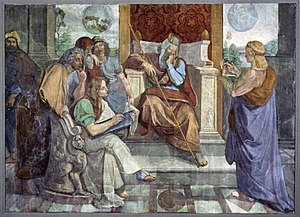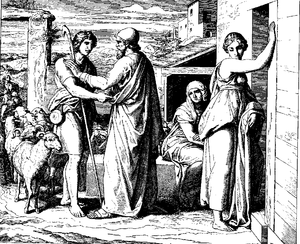 Image via Wikipedia
Image via Wikipedia Image via Wikipedia
Image via WikipediaWhenever a family has more than one child, the accusation “You love my brother more than me!” is often flung at parents. Sometimes, even spouses become jealous of the attention given to their child. Husbands are known to accuse their wives of giving their children more attention than they get from them.
I was one of three children. And, in my family, my youngest sister always enjoyed the closest relationship with my mother. No matter what my sister did to hurt or bother me, my mother always sided with her. I was usually reprimanded or asked to take on a broader view of things. Unfortunately, since I was only a few years older than she, I was no more able to do that than Heads of States are able to overlook grievances against their country.
Beneath the surface, my family was embroiled in controversies and resentments which re-surfaced, on occasion, even years later. Some things were forgotten but other things remained unforgiven. But, to put it into perspective of today’s reading, we never desired to kill one another.
In this head, I would likes to reflect on today’s chapters. Born to Rachel, the wife Jacob truly loved, Joseph was openly his father’s favorite son. While Jacob relished displaying his love for Joseph, the other sons of Jacob seethed in jealousy, resentment, anger, and hatred.
It seems that Joseph’s job, in the family livestock business, was to generate his siblings’ performance appraisals.(Genesis 37:2; 12 -14) Jacob, who, for twenty years, toiled for his uncle, to build up the livestock he took back to Canaan after leaving Laban, knew what it took to maintain and grow his flocks. Maybe Joseph shared his father's diligence and care in work, which could have also drawn them closer together.
A more striking similarity Joseph and Jacob shared was their relationship to God. Joseph's prophetic dreams, which caused his brothers to hate him even more, probably drew him closer to Jacob, who himself had come to know God intimately.
A more striking similarity Joseph and Jacob shared was their relationship to God. Joseph's prophetic dreams, which caused his brothers to hate him even more, probably drew him closer to Jacob, who himself had come to know God intimately.
While on a routine scouting errand for his father, Joseph was bound by his brothers and sold into slavery. Through God’s providence, Joseph was purchased by Potiphar, one of Pharaoh’s officials. In a very intriguing verse, Genesis 39:2,
“And the Lord was with Joseph, and he was a prosperous man; and he was in the house of his master the Egyptian.”
How can a slave be prosperous? A few verses later, after Joseph refused the sexual advances of Potiphar’s wife, he was falsely accused of attempted rape and then thrown into a dungeon. Again, how is this prosperous?
The Hebrew word used here is a fairly conventional “tsalach” which can mean to go above and beyond or to be good. But in any case, it implies abundance – more than expected. Here, the sense of prosperity was used in conjunction with the statement that the Lord was with Joseph. I wonder of the statement really means that Joseph grew in his knowledge and understanding of God; in his intimacy with God, so that when he could easily have sinned, he was able to turn away from it because he knew God. I believe that prosperity here refers to Joseph’s spiritual wealth which contrasted to his material poverty.
In Scripture, there is no record of Joseph ranting and cursing his brothers. Rather, he seemed to enter slavery with grace and equanimity. He did his job and clung to his knowledge of the Creator; clung to his knowledge of who he was in relation to the God of Abraham, Isaac, and Jacob. Through the many years that Joseph spent as a slave in Egypt












